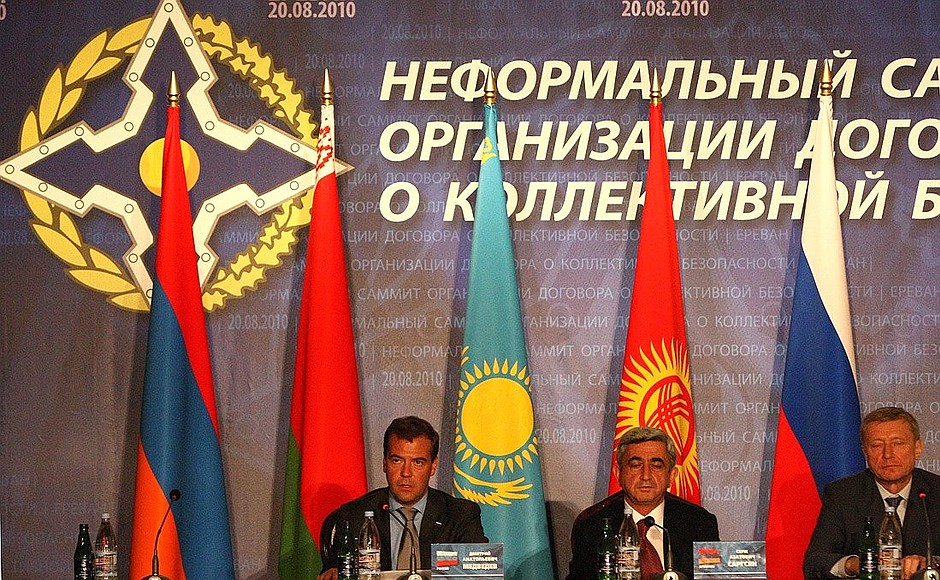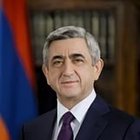
President of Armenia Serzh Sargsyan: Ladies and gentlemen,
This has been a dynamic and important day. We have just held a meeting of the CSTO Collective Security Council, during which an informal exchange of views on issues of common interest took place. The central theme of today's summit was the situation in Kyrgyzstan, specifically the measures that have been taken by the CSTO with a view to its early normalisation and the assistance that was provided by us to the fraternal Kyrgyz nation. Following our previous meeting in Moscow on May 8, 2010, a statement was adopted by CSTO heads of state on the situation in Kyrgyzstan, in which we expressed our readiness to provide humanitarian and other assistance to Kyrgyzstan in order to stabilise the situation in the country as quickly as possible.
Today we have reviewed the progress in implementing this decision, discussed the preliminary results, and exchanged opinions on our future steps. We reaffirmed our commitment to the decisions made at the May meeting and agreed to continue consultations on measures to stabilise the situation in Kyrgyzstan.
More generally, we talked about the need to create an effective crisis response system for the CSTO. This is a complicated issue and a highly relevant one. As you know, heads of CSTO member states raised this issue in May, and today we considered some initial proposals that were prepared by the Secretariat on the basis of our previous discussions. This time our exchange of opinions was more substantive and detailed. In addition, considering the evolving situation in our region, I presented our vision of the future strategy. We have outlined concrete steps to further deepen cooperation and interaction within the CSTO.
I am confident that a full implementation of these plans will take our organisation to a qualitatively new and higher level. Today's meeting is an important step in the further development of the security of our countries and the CSTO region. As President of the host country I would like to express my appreciation to the heads of state for taking part in this summit and the constructive and detailed exchange of views.
It is my great pleasure to give the floor to the President of the Collective Security Council, President of the Russian Federation Dmitry Medvedev.
President of Russia Dmitry Medvedev: Thank you, Mr Sargsyan. The first thing I would like to tell the members of the media here is how grateful we are to you, Mr President, and the Republic of Armenia for organising this informal CSTO summit and for creating excellent conditions for our work. We highly value it. This contributed to a constructive discussion that lasted even longer than we had planned and was conducted with great interest, utmost frankness and consideration. All this clearly demonstrates our commitment to developing the Organisation.
The Collective Security Treaty Organisation, although it is a relatively young body, is nevertheless a strong organisation, and one with significant powers, which makes a real difference to developments in its region of responsibility. The CSTO is a deterrent to a number of negative trends, particularly so-called frozen conflicts and other problems that exist in the region of CSTO responsibility. There are many problems; they are different, some are major and others are less significant, but in any case the CSTO’s influence is tangible, and this manifests its constructive purpose.
We summed up our countries’ security and discussed plans for the future. All of us intend to work effectively. We paid great attention to the situation in Kyrgyzstan, and the statements by Ms Otunbayeva and other colleagues were of great interest. We openly discussed what had happened, what lessons must be learned, what we can do today to help Kyrgyzstan and how to make sure that Kyrgyzstan becomes a strong state. There are a lot of problems, but we are prepared to work together. We analysed the report of the [CSTO] Secretary General on this issue, and I hope that we will be able to contribute to the stabilisation of the situation within the framework both of the CSTO member states and the bilateral relations with Kyrgyzstan which each CSTO state has.
Now let us look at the new, more effective CSTO crisis response mechanism. All of us have agreed that the lessons we have learned from the events in Kyrgyzstan have prompted us to strengthen this mechanism. What do we need to achieve that? We need the will of the states, and today this will was manifested. We have agreed that by December we will draft amendments to CSTO charter documents, which are the basis for our work, creating more effective institutions, possibly with expanded powers. Of course, such decisions are adopted by consensus, but nevertheless, everyone understands that the Organisation’s response in some cases must be quick and efficient. Our common position is that we should very carefully examine the experience of other organisations that have a longer history, specifically the North Atlantic Alliance, the European Union and the United Nations. Their experience should be analysed, and I hope that the CSTO Secretariat will summarise it in a report and submit it for review.
Our discussion was interesting, positive and direct. Although this is an informal summit, it is clear that many threads of our discussion today will continue at the December summit, which will be held in Moscow. This does not mean that our conversation has ended, we will still return to it, as Mr Sargsyan has created all the conditions for this, and I hope it will be constructive.
And the last point on which I would like to inform everyone: we have agreed that in December the CSTO presidency will go to one of the CSTO member states, to Belarus. The President of Belarus expressed his willingness to accept it, and we're very pleased about it because this testifies to the normal development of the Organisation and its management procedures.
